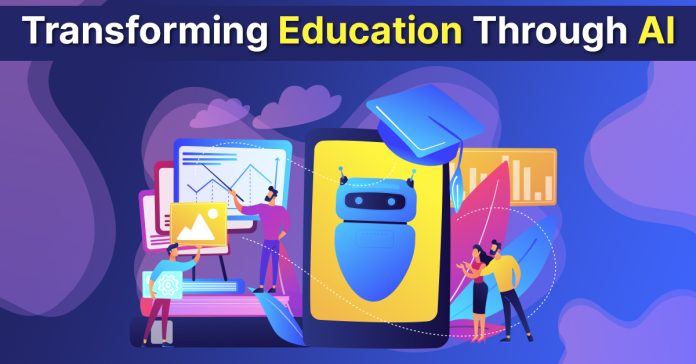AI is quickly changing the education scene and a lot of startups are driving the change. A report by Holon IQ reveals that the global education technology (EdTech) market is anticipated to be $404 billion by 2025 where AI-powered solutions will have a significant role.
AI in education can possibly change student learning and teaching completely. A McKinsey Global Institute study showed that AI-based personalized learning could boost the level of student involvement by up to 60% and the learning outcomes by 30%. GMInsights has another report that predicts that AI in the education market will surge at 10% CAGR from 2023 to 2032.
However, despite these challenges, more and more startups are coming up in this regard. A recent survey conducted by the World Economic Forum identified more than 3,000 EdTech startups globally with a significant number of companies looking to use AI to revolutionise the education process.
Let’s dive into how startups are leading the charge in this rapidly evolving field and the transformative benefits of AI in education that AI-powered solutions can have on student learning and teacher effectiveness.
The transformative power of AI in education
The implementation of Artificial intelligence in education systems is widening the horizon of personalized learning, intelligent tutoring, and data-driven assessment. AI adoption by educators and EdTech startups has opened up the path for a more engaging, adaptable and efficient learning environment.
Personalized learning experiences
Personalized learning is perhaps the most cutting edge impact of AI in education. Through the use of highly advanced algorithms and machine learning techniques, AI assesses the learning styles as well as the strong and weak sides of each student to individualize the educational program. This method of teaching makes sure that the student learns according to their own style and speed and therefore, they grasp the important ideas better and have proper retention.
Imagine a classroom where every student has an individual curriculum that is specifically designed to meet their needs and the curriculum changes in real time. This vision has become a reality which has been made possible by AI. So, educators can respond to individual needs of students and create an exciting and effective learning environment.
Optimization of administrative tasks
In addition, AI not only changes the way of learning but also reduces administrative processes in educational institutions. The educators’ time and resources are usually taken up by tasks like ensuring that the assignments are correct, planning class activities, and monitoring students’ progress. Nevertheless, AI-generated technologies have the potential to perform such tasks, thus enabling teachers to focus more on the key interactions with their students.
As an example, AI algorithms can grade assignments with high accuracy and speed thus giving students instant feedback and helping educators find the areas they need to focus on more intently. Furthermore, AI-based scheduling systems take into account student availability and resource allocation as factors in the optimization of class schedules, hence ensuring the equal usage of educational resources.
Unlocking new avenues for research and development
AI does not only make the learning process easier for students but it also expands horizons of research and development in education. By means of big data and identification of patterns and trends, artificial intelligence provides data concerning learning results, teaching methods, and best practices.
Also, AI enables the development of educational technologies, techniques, and approaches such as virtual reality simulations, adaptive learning systems, and intelligent tutoring systems. These innovations may have a radical impact on instructions as such, they will allow education to be convenient for learners of all ages and backgrounds.
Startups driving innovation in education
Let’s see how startups are driving innovation in education:
1. Adaptive learning platforms
EduAI and LearnSync, the startups that create learning platforms with adaptable systems by integrating AI in education, are the leaders on the way to a new development of student engagement mode with educational content. These platforms are the ones that use AI algorithms in order to individualize the learning process and requirements of each student, delivering personalized learning experiences curated for each student’s personal preferences.
Using the speed, difficulty degree and lesson content parameters in a recursive manner, these platforms allow students to have a direct effect on the way they learn and they are capable of learning easily.
2. Virtual tutoring services
Virtual tutoring arena which happens to be the domain of startups like TutorTech and AI tutors has suddenly become a very important part of the education ecosystem with the rise of remote distance learning. AI-powered platforms and technologies, such as natural language processing and machine learning, are now deployed by these platforms to help students from different spheres study in a convenient manner and at their own pace.
Either through enlightening the complex ideas, providing further opportunities to exercise or offering the required feedback, these startups make it possible for students to receive the needed support to succeed well academically and despite their geographical issues and time constraints.
3. AI-Powered assessment tools
Historic methods of assessment had always proved to be time-consuming and subjective, as they told very little about the student’s progress and clarity of instructions for both students and teachers. Nonetheless, startups such as AssessAI and AI Exam Proctor are bringing about transformations in the assessment domain through AI-based assessment tools and software.
These platforms implement artificial intelligence algorithms that analyse students’ responses, check assignments, and deliver immediate feedback, which saves teachers time and resources and at the same time provides fair and transparent assessment. Through individualized responses and the integration of AI in educational systems, these startups equip students with the necessary tools to discover their weak areas and aid their learning process by making their own efforts.
Challenges and considerations
AI in educational systems has many opportunities but also many challenges that need to be addressed. The challenges are multidimensional and include privacy and data security, ethical concerns, and barriers to use.
Privacy and data security concerns
As AI finds increasing application in education, concerns arise around safeguarding student information. The assortment and utilization of understudy information by AI-controlled stages ought to be cautiously overseen to ensure the secrecy and strength of touchy subtleties.
Ethical considerations in AI-driven decision-making
In addition, the developing effect of AI and education necessitates a sober-minded assessment of moral repercussions. As AI frameworks end up distinctly included in regions, for example, understudy appraisal, scholarly counseling, and asset designation, it is vital to guarantee these calculations are intended and actualized reasonably, without predisposition, and with transparency.
Conclusion
As the training part receives AI’s advantages, start-ups have risen as the driving power behind a significant part of the advancement in this field. The future of AI-propelled training holds immense potential, as progressions in AI and machine learning, combined with the developing selection of these innovations, will presumably result in more transformative applications in the homeroom and past.
To build quality AI-powered apps and solutions for education and eLearning, hire AI developerswith experience in integrating these transformative technologies into educational systems. By leveraging the expertise of skilled AI professionals, EdTech startups and educational institutions can harness the full potential of artificial intelligence to shape the future of learning.






